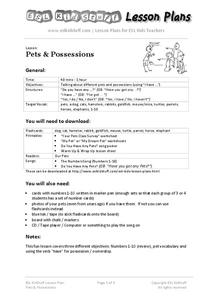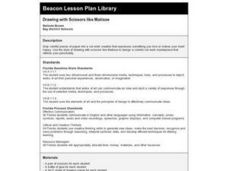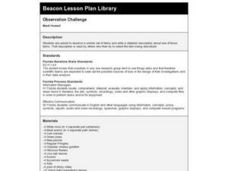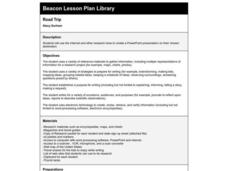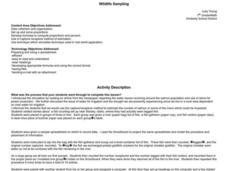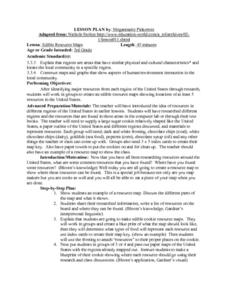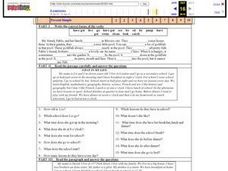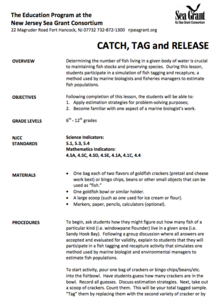Curated OER
The Letter Ff: Alphabet Theme
Students complete several cross-curricular activities to learn the letter Ff. In this letter recognition lesson, students complete activities that include geography, music, physical education, science, seasonal, space science, and online...
Curated OER
Water Quality Tests Explained
Students identify the eight tests done to check for water quality. In this ecology lesson, students explain why it's important to test water in rivers. They explore sources of river water pollution.
Curated OER
How Many More?
Students complete subtraction problems where they use goldfish crackers as their manipulatives in the problem. In this subtraction lesson plan, students use words and pictures to also show their problems.
Curated OER
Estimation Station
Students use this hands-on math center to explore estimation and counting by tens with Goldfish.
Curated OER
Embroidery As A Form Of Art
Students create a "class quilt" using techniques learned from the study of Asian textile practices in this six-day lesson for upper-elementary school. This lesson requires parent volunteers.
Curated OER
G is for Goose: Printing Practice
For this letter G printing practice worksheet, students trace the upper and lower case letter, then practice writing them, along with the words 'goose' and 'goldfish.'
ESL Kid Stuff
Pets & Possessions
Language learners engage in a series of games and activities using pet vocabulary and the verb "have" to show possession or ownership.
Curated OER
Drawing With Scissors Like Matisse
Students study the life and art style of Henri Matisse. They view various prints from his early and late art styles. Then students draw something they enjoy and cut out pieces of colored construction paper and glue them onto pieces of...
Curated OER
No Plagiarism, Please!
Third graders listen to a lecture on how to take notes and discuss the skills of paraphrasing and correctly citing resources. They prepare note cards according to the format presented in class.
Curated OER
Environment: Fishing and Property Rights
Students participate in a role-playing "fishing game" to discover how over-harvesting can eliminate a resource. In the second round of the game, students are told they can only fish in their assigned territories.
Students explain the...
Curated OER
Observation Challenge
Fourth graders, in groups, use observation skills at 12 stations and describe what they see.
Curated OER
Road Trip
Students create PowerPoint presentations on destinations researched on the Internet.
Curated OER
Oxygen Levels and Aquatic Plants and Animals
Young scholars design an experiment to test the effects of a change in the amount of dissolved oxygen of water on aquatic plants and animals. Questions are offered for exploration and experiment design. Results are tabulated and...
Curated OER
Pets are for Life
Students research the life spans of several animals and create bar graphs comparing this data. Students, as a class, discuss the long term commitment of owning a pet. Students imagine how their lives would be different if they had a pet...
Education World
Edible Resource Maps!
Young scholars discuss resource maps and examine examples from library resources. Working in groups, they create edible resource maps by drawing examples, such as popcorn on the border of Iowa and Nebraska. Then they use cookies in the...
Curated OER
Fish Workings
Learners observe, hypothesize, and draw conclusions regarding fish. They examine their anatomy, and how they function in their environment.
Curated OER
Go Fish:
Third graders imagine that they are asked to determine the number of fish in a nearby pond. To count the fish one by one, they could remove the fish from the pond and stack them to one side, or mark each fish so they would not count them...
Curated OER
Wildlife Sampling
Seventh graders use paper bags and crackers to simulate a wildlife sampling of salmon. They record data on spreadsheets and determine a formula to estimate salmon populations.
Curated OER
Gone Fishin'
Students explore fishing and the food web. They simulate the role of fisherman using candy as fish and use provided materials to create a fishing device. Afterward, they complete data tables to organize the day's catch and report the...
Curated OER
Edible Resource Maps
Third graders work in groups to create an edible resource map showing locations of at least five resources in the United States. Students research on the internet different regions and the resources that are found in those areas. They...
Curated OER
Present Simple Verb and Comprehension Worksheet
In this verb form and comprehension worksheet, students fill in 25 blanks with the correct verb forms in 2 paragraphs. They read 2 short paragraphs and answer 23 short answer questions based on their comprehension of the reading.
Curated OER
Capture/Recapture
Students use proportions to estimate the size of populations. They describe the data with using a graph or table of the estimate. Students use descriptive statistics to calculate mean, median, and mode. They also compare and contrast an...
Curated OER
Catch, Tag, and Release
Learners discover how fish tagging is used by marine biologists and fisheries to estimate fish populations. Participating in a simulation, young scholars use estimation to determine the whole population from a small number of items.








